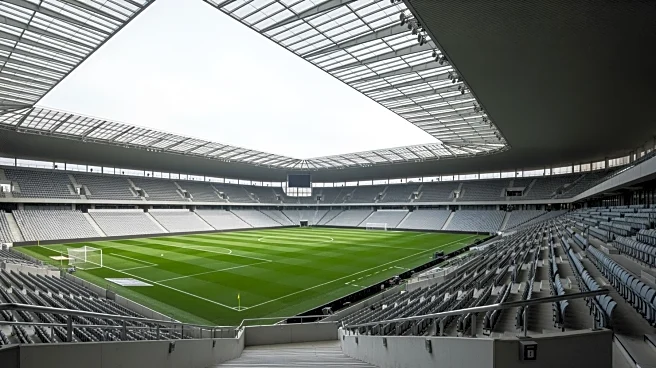What's Happening?
Barcelona is set to play against Athletic Bilbao at the newly renovated Spotify Camp Nou stadium in a La Liga match on November 22. The announcement was made via the club's social media channels. Despite
the stadium's full capacity of 99,354 seats, only 45,000 fans will be able to attend the match due to incomplete licensing stages. The club aims to secure the next license, which will increase the capacity to 60,000, by early 2026. Barcelona last played at their home stadium on May 28, 2023, achieving a 3-0 victory over Mallorca before the stadium closed for reconstruction. Currently, Barcelona is in second place in the La Liga table with 28 points after 12 rounds.
Why It's Important?
The reopening of the Camp Nou is significant for Barcelona as it marks the return to their iconic home ground after a lengthy reconstruction period. The limited attendance due to licensing issues highlights ongoing logistical challenges that could impact revenue and fan engagement. The stadium's renovation is part of broader efforts to modernize facilities and enhance the club's global brand. The reduced capacity may affect matchday earnings and the atmosphere, which are crucial for team morale and fan experience. The club's position in the league standings adds pressure to perform well in their homecoming match.
What's Next?
Barcelona's management is focused on obtaining the necessary licenses to increase stadium capacity, aiming for early 2026. This will allow more fans to attend matches, potentially boosting revenue and enhancing the matchday experience. The club's performance in upcoming matches will be crucial in maintaining their position in the league standings. Additionally, plans to erect a monument to Lionel Messi at the stadium could further solidify the club's legacy and attract global attention.
Beyond the Headlines
The renovation of Camp Nou and the planned monument to Lionel Messi reflect Barcelona's commitment to preserving its rich history while adapting to modern demands. These developments may influence other clubs to invest in similar upgrades, impacting the broader landscape of European football. The focus on licensing and capacity issues underscores the complexities of stadium management and the importance of regulatory compliance in sports operations.










